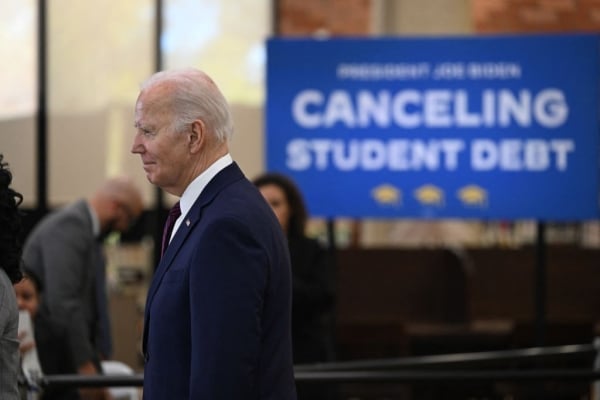The Biden administration on Friday withdrew proposed rules that would have extended Title IX protections to transgender student athletes and could have offered debt relief to millions of borrowers facing financial hardship.
Both proposals faced mixed public sentiment and significant legal challenges, and the withdrawals come as President-elect Donald Trump gears up for his second term in office next month.
Title IX
Title IX regulations have ping-ponged back and forth between Democratic and Republican administrations since President Barack Obama’s administration. Trump and some conservative lawmakers have criticized the proposed rule. The proposal would have prohibited blanket bans on transgender students’ participation on sports teams aligning with their gender identities.
The Biden administration had originally intended to finalize the rule in late 2023, but repeatedly delayed amid political and public controversy and the impending 2024 presidential election.
The U.S. Department of Education “recognizes that there are multiple pending lawsuits related to the application of Title IX in the context of gender identity, including lawsuits related to Title IX’s application to athletic eligibility criteria in a variety of factual contexts,” said the Federal Register notice announcing the end to this rulemaking. The rule had been intended as an update to regulations under the 1972 Title IX statute barring sex discrimination in federally funded education programs.
The department’s withdrawal notice, which was filed Dec. 20 and is expected to be published Dec. 26, noted that the agency received more than 150,000 widely varying comments during a 30-day comment period after the proposed rule’s April 2023 release.
Some commenters recommended the rule include more students, particularly in K-12, who could participate on a sex-separate athletic team consistent with their gender identities. But others called the proposed rule too complex and predicted it would face implementation challenges.
A “significant number” of commenters also cited case law, scientific studies and research that supported adopting, modifying or withdrawing the proposed rule, according to the notice.
From the outset, the proposed rule led to a hotbed of controversy in the political arena.
In a statement Friday, Rep. Virginia Foxx, a Republican from North Carolina, welcomed the proposal’s demise.
“The Biden-Harris administration’s proposed rule to hurt women’s sports is antithetical to the cornerstone of sports — fairness,” said Foxx, who chairs the House’s education committee. She said allowing transgender women — who she referred to as men — and cisgender women to compete limits the latter’s opportunities and runs antithetical to Title IX.
Foxx’s statement noted that the Republican-majority House passed the Protection of Women and Girls in Sports Act in April 2023, which states that in the athletic context, sex is recognized as “based only on a person’s reproductive biology and genetics at birth.”
States have also set policies on including transgender athletes on sports teams. Some 25 states — including Alabama and Texas — prohibit transgender students from participating in sports aligned with their gender identity, according to the Movement Advancement Project, which tracks the issue.
Texas Attorney General Ken Paxton announced Sunday that he is suing the National Collegiate Athletic Association over its inclusion of transgender athletes in women’s sports.
Though conservatives often focus on who plays on women’s teams, the state legislation typically bans transgender men from joining men’s teams as well.
The Title IX athletics proposed rule is separate from a broader Title IX final rule that extends sexual discrimination protections to include LGBTQI+ students and staff. That rule, which was implemented in August, faces several legal challenges and is temporarily blocked in at least 26 states.
Many educators and policy watchers are anticipating that the incoming Trump administration will rescind that rule and reinstate a 2020 Title IX regulation implemented by the first Trump administration. The 2020 rule has a narrower definition of sex-based harassment and differs also in reporting, complaint investigation and resolution practices.
Debt forgiveness amid financial hardship
The Biden administration also withdrew a student loan forgiveness proposal that stemmed from months of negotiated rulemaking.
Under the proposal, borrowers who faced financial hardship, such as unexpected medical bills or natural disaster-related expenses, would have been eligible to have their entire outstanding loan balances forgiven.
In October, the department estimated that 8 million borrowers — including a high concentration of Pell Grant recipients — would have received relief if the rule were finalized.
The Biden administration’s previous attempts to enact widespread student debt relief faced numerous legal challenges and often died in the courts.
In 2023, the U.S. Supreme Court struck down President Joe Biden’s initial plan for debt relief, which would have provided up to $20,000 in student loan forgiveness for borrowers who made less than $125,000 annually.
Biden then turned to regulatory proposals. Conservative states led lawsuits against those efforts, however, and federal judges have since halted their implementation.
President-elect Trump has been a staunch opponent of broad student loan debt relief and praised the Supreme Court’s decision to strike down Biden’s forgiveness plan. Had Biden not withdrawn his proposal, experts gave it a dismal chance of survival under the new Trump administration.





















Discussion about this post